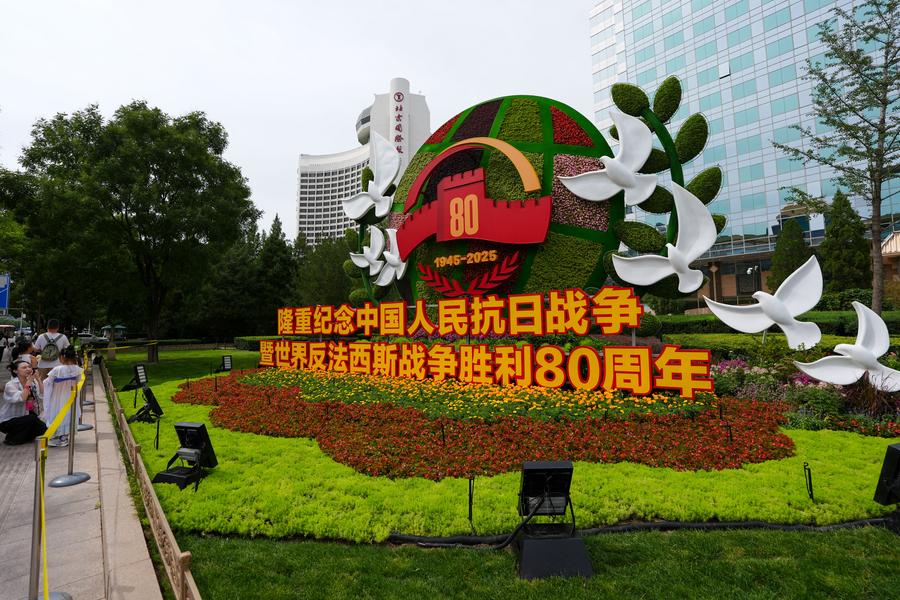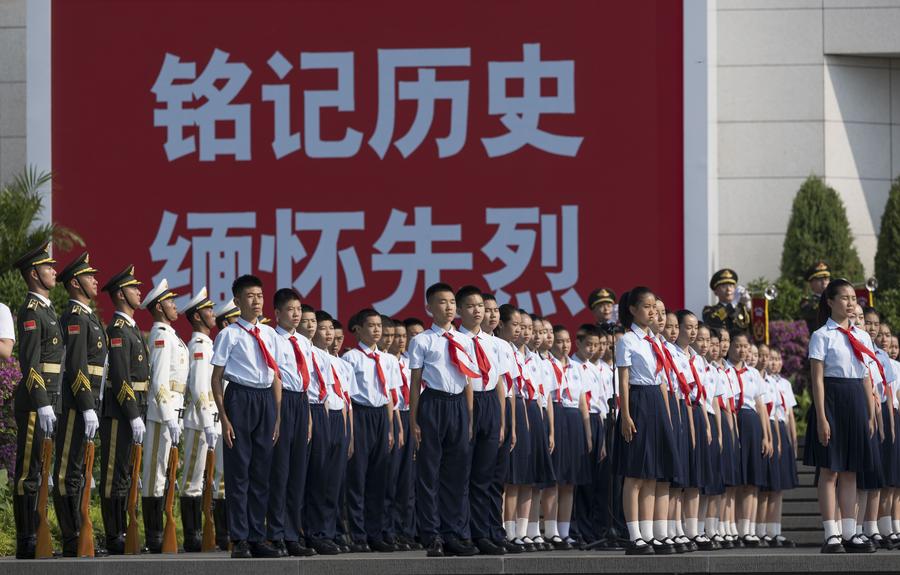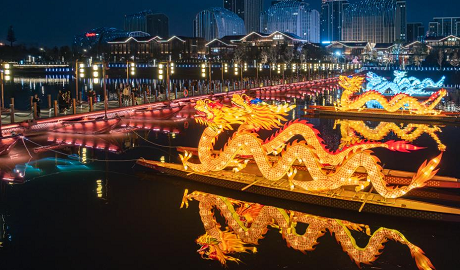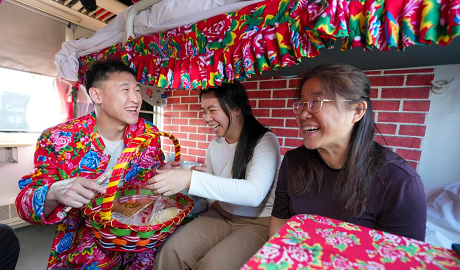


A set of floral installation is pictured at Jianguomen in Beijing, capital of China, Aug. 26, 2025. (Xinhua/Ju Huanzong)
An old Chinese saying goes: "Do not do unto others what you do not want done unto yourself." Having endured invasion and oppression, the Chinese people came to embrace an even stronger commitment to peace and justice.
BEIJING, Sept. 2 (Xinhua) -- Marking the 80th anniversary of the victory in the Chinese People's War of Resistance Against Japanese Aggression and the World Anti-Fascist War, Sept. 3, 2025 is a solemn day for China and the world to honor history and the fallen, and reaffirm the pursuit of peace and justice.
Eighty years ago, facing extremely difficult environment, the heroic Chinese people fought and won a formidable war against the Japanese aggression. More than 35 million Chinese soldiers and civilians were killed or injured in the war, leaving behind a lasting legacy of sacrifice for global peace.
This victory marked a turning point: for the Chinese nation, it ended a century-long spiral of decline and opened the door to rejuvenation; for the world, it ensured fascism's defeat.
An old Chinese saying goes: "Do not do unto others what you do not want done unto yourself." Having endured invasion and oppression, the Chinese people came to embrace an even stronger commitment to peace and justice.
At the 1955 Bandung Conference, China advanced the approach of "seeking common ground while shelving differences," encouraging unity and cooperation among newly independent nations. The conference signaled the political awakening of the developing world and showcased China's commitment to promoting more equal international relations.
In the decades that followed, China firmly supported national liberation movements worldwide: backing Algeria's independence, assisting Vietnam in resisting the U.S. interference, expressing solidarity with the Palestinian people, opposing apartheid in South Africa and so on. All these gave practical meaning to the spirit of internationalism.
As a permanent member of the UN Security Council, China actively participates in the mediation of hotspot issues, promotes the peaceful settlement of differences and disputes among countries, and has always been a builder of world peace. China firmly upholds the UN-centered international system, and actively works for a more just and equitable international order.
In the past decades, China's rapid development has also created opportunities for the wider world. Since its reform and opening-up, China's economy has grown more than 300 times, becoming the world's second-largest economy. For years, China has contributed around 30 percent to global economic growth annually. In the era of economic globalization, China is not only a beneficiary but also a key promoter of and contributor to global prosperity.

Students attend a ceremony to mark the 88th anniversary of the start of the entire nation's resistance against Japanese aggression, in Beijing, capital of China, on July 7, 2025. (Xinhua/Cai Yang)
Meanwhile, nearly 800 million Chinese people have been lifted out of poverty, accounting for three-quarters of the world's poverty reduction in the same period. In 2021, Chinese President Xi Jinping announced that China had secured a "complete victory" in its fight against poverty. Thus, China had met the poverty eradication target set out in the UN 2030 Agenda for Sustainable Development 10 years ahead of schedule.
As the world's largest developing country and a natural member of the Global South, China closely links its own development with the revitalization dreams of the vast number of developing countries.
The Belt and Road Initiative (BRI) has linked Asia, Africa, Latin America, Pacific islands and other countries with new opportunities of development. Roads, railways, ports and energy projects have brought tangible benefits, while training programs and digital innovations have opened new paths to modernization.
The world today is undergoing changes unseen in a century. Global recovery remains fragile, the development gap is widening, environmental challenges are worsening, and the Cold War mentality still persists. Against this backdrop, a resounding question facing all nations is: what kind of world should we build, and how?
China has proposed the vision of building a community with a shared future for humanity. Through initiatives such as the BRI, the Global Development Initiative, the Global Security Initiative, the Global Civilization Initiative and the Global Governance Initiative, China promotes cooperation on growth, peace, and security as well as people-to-people exchanges. Its efforts reflect a commitment to inclusiveness, mutual benefit and respect for diversity and have won wide international support, especially among developing countries.
China's firm commitment to peaceful development and win-win cooperation is deeply rooted in its millennium-old civilization. History shows that the tide of peace and development cannot be reversed. China will stay on the path of peaceful development and work hard to build a brighter shared future together with all nations.

Various festive events held across China to celebrate upcoming Chinese New Year


Hit epic drama sparks interest in lesser-studied chapter of ancient Chinese history

Lanterns hoisted to mark upcoming Chinese New Year in Hong Kong

"In-train fair" launched in NE China's Heilongjiang amid Spring Festival travel rush
点击右上角![]() 微信好友
微信好友
 朋友圈
朋友圈

请使用浏览器分享功能进行分享
